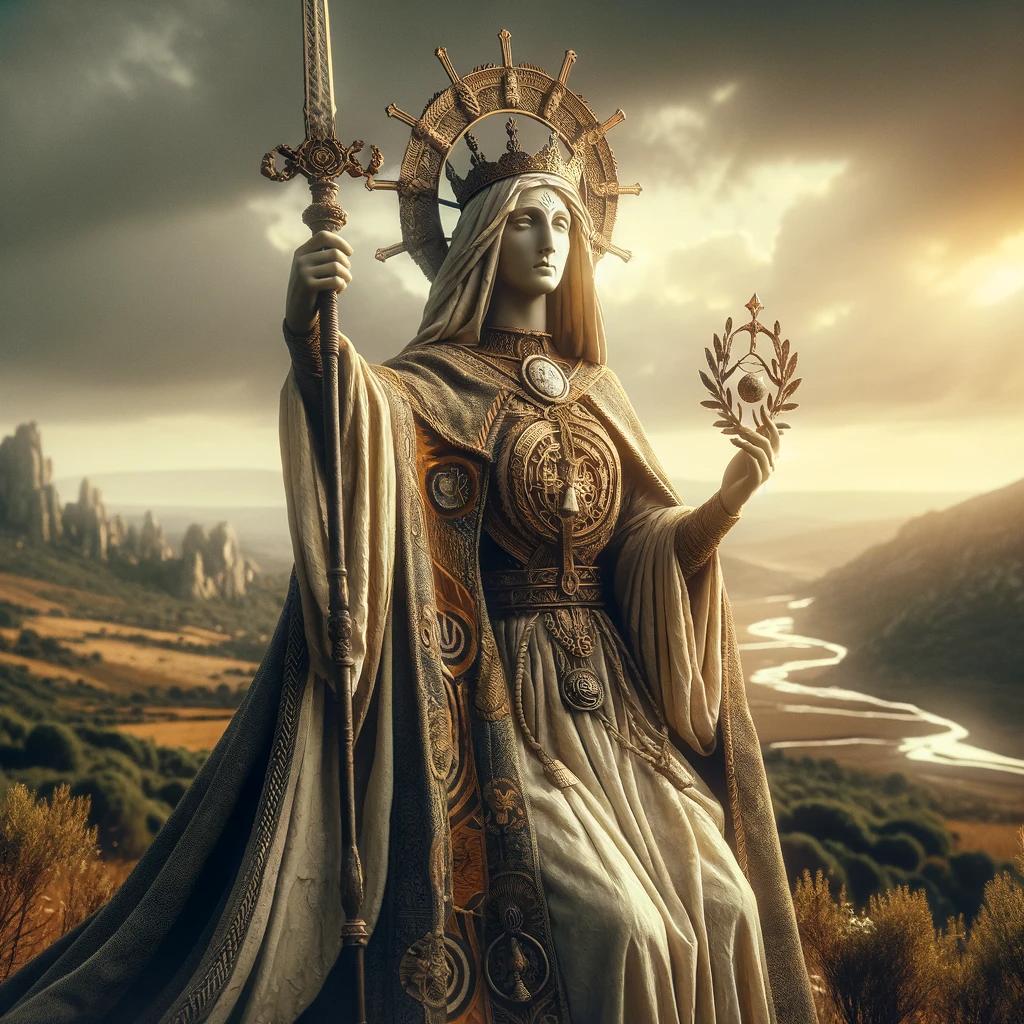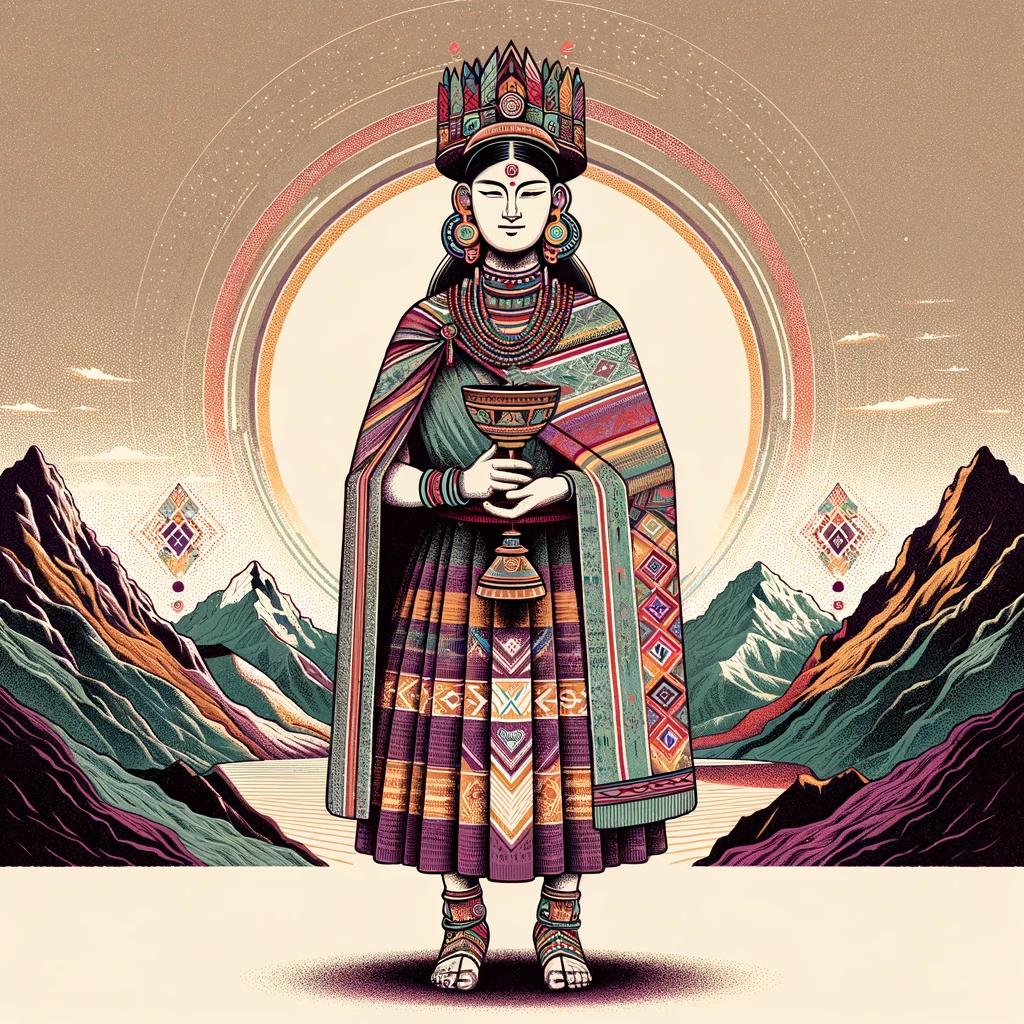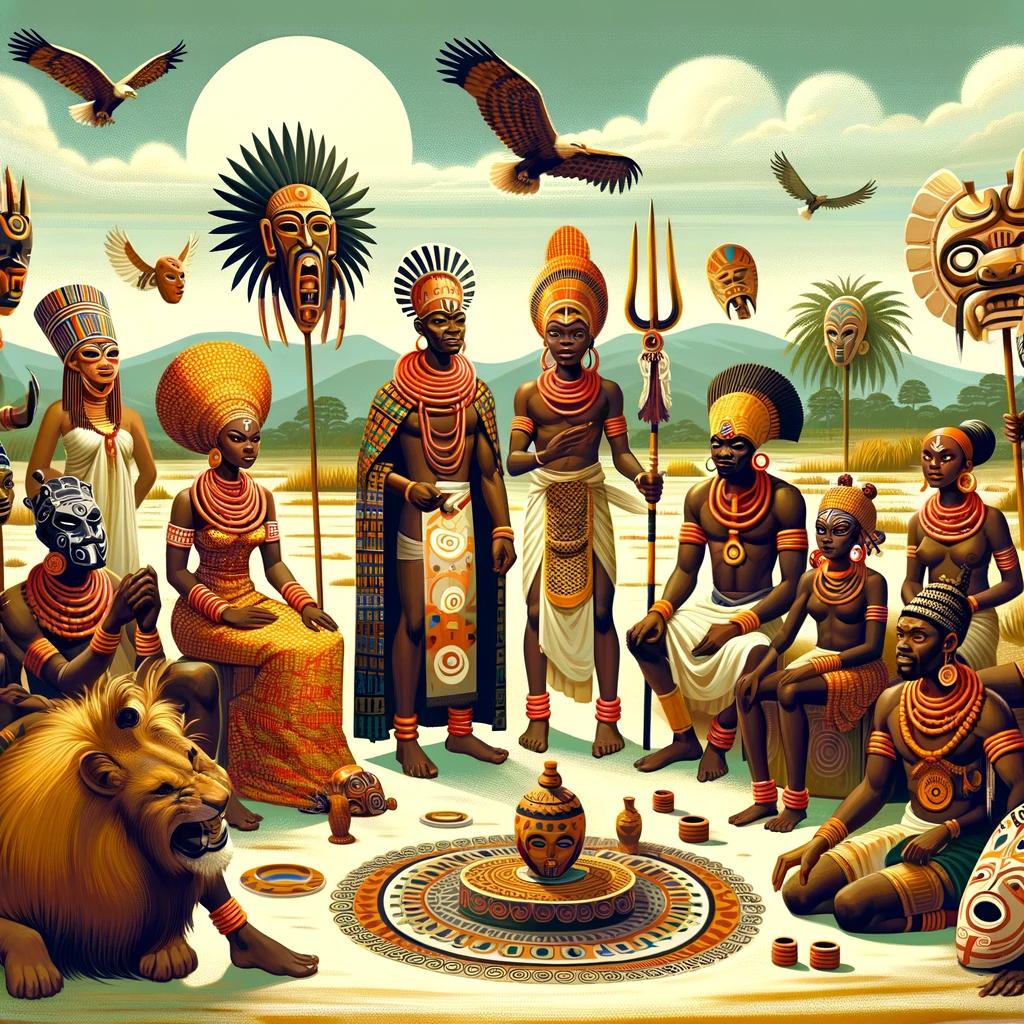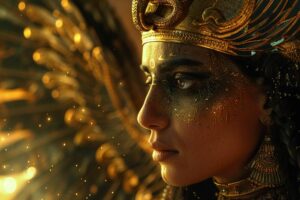Lusitanian Mythology Gods and Goddesses: Tales of Ancient Portuguese Deities

Lusitanian mythology gods and goddesses were revered for their association with natural forces and celestial bodies. Endovelicus, the protector of the people and the land, embodied protection, fertility, and agriculture.
Ataegina, the goddess of fertility and earth, symbolized abundance and brought prosperity to the land. Bandua, the god of war and hunt, offered strength and courage, safeguarding the people during conflicts and ensuring successful hunts.
Other deities like Nabia, the goddess of freshwaters, and Trebaruna, the goddess of thunder, held powers of healing and weather control. These ancient Lusitanian beliefs also encompassed nymphs and spirits tied to specific natural elements.
The article delves into these deities’ attributes, offering insights into their myths, rituals, and contemporary significance.
Endovelicus: Protector of the People and the Land
Endovelicus, a prominent deity in Lusitanian mythology, held the crucial role of protecting the people and the land. With his depiction as a warrior wielding a sword and shield, Endovelicus symbolized bravery and defense.
His close association with the well-being of the community highlighted his mythical attributes and symbolism, showcasing his divine power and influence over nature.
Mythical Attributes and Symbolism
Endovelicus was revered for his ability to safeguard the Lusitanian people and their territories. As the guardian deity, he symbolized protection, nurturing the land’s fertility and ensuring its abundance. The sword he wielded represented his strength and determination in defending his worshippers from external threats.
Similarly, the shield signified his role as a shielder against harm and malevolent forces. Endovelicus’ representation as a warrior emphasized his heroic nature and unwavering dedication to his followers.
Role in Fertility and Agriculture
Through his divine influence, Endovelicus played a vital role in the fertility and agricultural prosperity of the Lusitanian society. It was believed that he blessed the land, ensuring bountiful harvests and the proliferation of crops.
The Lusitanians regarded Endovelicus as a benevolent deity who not only protected their physical well-being but also nurtured their agricultural endeavors. Farmers and cultivators looked to him for assistance in ensuring successful harvests and the growth of their crops, acknowledging his role as a guardian of fertility and agriculture.
Ataegina: Goddess of Fertility and Earth
Ataegina, the goddess of fertility and earth, holds a significant role in Lusitanian mythology. Her depiction and symbols reveal her association with abundance and prosperity.
Depiction and Symbols
Ataegina is often portrayed as a youthful woman carrying a basket filled with fruits and flowers. This imagery symbolizes the bountiful harvests and the thriving of nature under her divine influence.
The basket represents the abundance she bestows upon the land.
Additionally, Ataegina is depicted with a vibrant crown made of intertwined branches and leaves, showcasing her connection to the earth and vegetation.
The crown represents her power over the fertility of the land and the growth of crops.
Beliefs and Offerings
Within Lusitanian beliefs, Ataegina was worshipped as the mother goddess, believed to bring good fortune and prosperity to the people. To seek her favor, offerings were made to honor her and ensure the fertility of the land.
The offerings to Ataegina included freshly harvested fruits, vibrant flowers, and specially prepared meals. These offerings were presented in ceremonies and rituals conducted by the Lusitanian community, demonstrating their reverence for the goddess and their reliance on her to sustain their agricultural endeavors.
Devotees believed that by paying homage to Ataegina and offering these gifts, they would gain her favor, resulting in abundant harvests, healthy livestock, and overall prosperity for their communities.
- Offerings to Ataegina:
- Freshly harvested fruits
- Vibrant flowers
- Specially prepared meals
Throughout Lusitanian society, Ataegina was revered for her ability to bring fertility to the earth and ensure the prosperity of the people through agricultural abundance and sustenance.
Bandua: God of War and Hunt
Bandua played a crucial role in Lusitanian mythology as the god of war and hunt. Represented as a fierce warrior armed with a lance and shield, Bandua held significant significance in the lives of the ancient Lusitanian people.
Representation and Significance
The depiction of Bandua as a formidable warrior emphasized his association with strength, courage, and military prowess. His intense presence and fierce attributes made him a symbol of protection and victory in times of war.
As the god of hunt, Bandua was also revered by Lusitanian hunters who sought his favor for a successful and fruitful hunt. They believed that with Bandua’s blessings, they would obtain abundant game and ensure sustenance for their communities.
Relation to Warriors and Hunting Traditions
Bandua held a special connection with the warriors of the Lusitanian tribes. His association with war made him an important deity to whom warriors looked up to for guidance, protection, and triumph on the battlefield.
In the hunting traditions of the Lusitanians, Bandua was invoked to bestow skill and luck upon hunters, guaranteeing their safety and prosperity. Rituals and offerings were dedicated to him to honor his role in ensuring successful hunts and the well-being of the community.
Bandua’s influence was deeply ingrained in the Lusitanian society, serving as a guardian and provider for both warfare and hunting endeavors. His power and impact remained significant throughout the ancient Lusitanian culture, shaping their beliefs and practices.
Nabia: Goddess of Freshwaters and Springs
Nabia, the goddess of freshwaters and springs, held a significant role in Lusitanian mythology. She was revered for her powers of healing and her association with the life-giving properties of water.
In this section, we will explore her powers and healing properties, as well as her significance in rituals and worship.
Powers and Healing Properties
Nabia was believed to possess exceptional powers and abilities related to the waters she governed. She held the ability to purify and cleanse, both physically and spiritually. Her waters were considered to have healing properties, and those who bathed or drank from them believed to be rejuvenated and cured of ailments.
The Lusitanians attributed Nabia with the power to restore vitality, bring harmony, and promote overall well-being. It was believed that she could heal both physical and emotional wounds, offering solace and comfort to those in need.
This healing aspect made her one of the most revered deities in Lusitanian mythology.
Significance in Rituals and Worship
Rituals and worship dedicated to Nabia played an essential role in the religious practices of the Lusitanian people. Springs and water bodies associated with her were sanctified and considered sacred spaces where devotees sought her blessings.
Worshippers would gather near these sacred waters to offer prayers, sacrifices, and gifts to honor Nabia. It was customary for individuals seeking healing or protection to immerse themselves in her waters or drink from them as part of the ritual.
These acts were believed to invoke her divine presence and harness her healing powers.
During specific festivals and ceremonies, rituals would be performed to celebrate Nabia’s influence and express gratitude for her benevolence.
The Lusitanians believed that through their devotion and reverence, they could strengthen their connection with Nabia and receive her blessings of healing, cleansing, and purification.
- Nabia’s healing powers were considered particularly effective in treating ailments related to fertility, childbirth, and overall wellness.
- Worshippers attributed her with the ability to bring prosperity and abundance to their communities.
- She was often depicted as a graceful goddess holding a vessel overflowing with water, symbolizing her connection to the life-giving force of freshwater.
As the goddess of freshwaters and springs, Nabia held a vital role in the ancient Lusitanian pantheon.
Her powers of healing and rejuvenation, along with her significance in rituals and worship, made her an integral part of Lusitanian mythology and culture.
Trebaruna: Goddess of Thunder and Lightning
Trebaruna is a prominent figure in Lusitanian mythology, known as the powerful goddess of thunder and lightning. She commands the forces of nature and holds great significance in the realm of storms and weather control.
Let’s delve into her mythological role and attributes, as well as her associations with storms and weather manipulation.
Mythological Role and Attributes
Trebaruna is revered as the almighty goddess who governs the domain of thunder and lightning. Often depicted with a thunderbolt in hand, she embodies the raw power and energy unleashed by thunderstorms.
Her role is deeply intertwined with natural phenomena, symbolizing the electrifying forces that shape the skies.
Within Lusitanian mythology, Trebaruna’s attributes reflect her dominion over thunder and lightning. She is revered as the bringer of storms, capable of controlling the tumultuous sound of thunder and the dazzling strikes of lightning.
As a deity associated with the celestial realm, Trebaruna is believed to have the ability to evoke both fear and awe among the Lusitanian people. Her ferocity and might are often compared to the unstoppable forces of nature, making her one of the most formidable deities within their pantheon.
Associations with Storms and Weather Control
Trebaruna’s presence extends beyond her mythical role as a goddess of thunder and lightning. She is closely associated with storms and holds a measure of control over weather patterns, according to Lusitanian beliefs.
In ancient traditions, Trebaruna was invoked to help control and channel the powers of storms, ensuring the safety and benefit of the Lusitanian people. It was believed that through her influence, she could inspire favorable weather conditions for sustenance and agricultural prosperity.
Significance in Rituals and Worship
Rituals in honor of Trebaruna often involved offerings and prayers to appease her forces and seek her favor. The Lusitanians showed great reverence and respect for her power, understanding the importance of her influence on their day-to-day lives.
In times of impending storms or severe weather events, the Lusitanians would turn to Trebaruna, seeking her protection and guidance. By performing rituals and making offerings, they hoped to gain her favor and mitigate the potential destructive forces of thunderstorms.
The devotion to Trebaruna as a goddess of thunder and lightning exemplifies the deep connection and respect the Lusitanian people had for the forces of nature. They understood the potential impact of weather on their lives and sought solace and reassurance from the powerful goddess.
Conclusion
Trebaruna held a significant role in Lusitanian mythology as the goddess of thunder and lightning. Her attributes as a deity of raw power and weather manipulation instilled fear and awe among the people.
Through rituals and offerings, the Lusitanians sought her favor and protection during storms. Trebaruna’s influence highlights the profound connection between nature and spirituality in Lusitanian culture.
Other Deities in Lusitanian Mythology
In addition to the prominent gods and goddesses, Lusitanian mythology encompasses a diverse range of deities.
Exploring additional gods and goddesses sheds light on the intricate belief system of the ancient Lusitanians.
Exploring Additional Gods and Goddesses
Alongside the well-known deities, the Lusitanians revered a pantheon of other gods and goddesses. These lesser-known figures held significance in various aspects of life and nature. Some notable examples include:
- Cariocecus: A deity associated with war, known for instilling courage in warriors.
- Neto: A god revered for his protective nature, guarding the Lusitanians during times of conflict.
- Trebaruna: A powerful goddess associated with thunder and lightning, believed to have the ability to control the weather.
These additional deities provided the Lusitanians with a broad spectrum of divine guidance and protection.
Nymphs and Spirits in Lusitanian Beliefs
Besides gods and goddesses, the Lusitanians believed in the existence of nymphs and spirits closely tied to specific natural elements. These supernatural beings inhabited sacred places such as forests, rivers, and mountains, guarding their respective domains.
They played an essential role in the Lusitanian worldview, serving as intermediaries between humans and the divine.
The nymphs, associated with beauty and fertility, were believed to bring prosperity to the land and protect the delicate balance of nature.
The spirits, on the other hand, embodied the essence of the natural elements they represented, influencing everything from weather patterns to the growth of crops.
The reverence for nymphs and spirits showcased the Lusitanians’ deep connection to the environment and their belief in the interplay between the physical and spiritual realms.
Ancient Lusitanian Supernatural Beings
The ancient Lusitanians revered a diverse array of supernatural beings that were deeply interconnected with the natural world. These entities included nymphs and mythical creatures, each associated with specific elements and endowed with unique powers and characteristics.
Understanding Nymphs and their Natural Associations
In Lusitanian mythology, nymphs held a prominent role as spirits tied to distinct natural features such as forests, rivers, and mountains. Considered guardians and embodiments of these environments, they were believed to possess immense knowledge and influence over their respective domains.
- Forest Nymphs: Forest nymphs, known as Dryads, were intimately connected to the woods, trees, and all the life thriving within. They were revered as protectors of flora and fauna, often depicted as ethereal maidens with branches and leaves adorning their hair.
- River Nymphs: River nymphs, also called Naiads, were associated with water bodies, from serene streams to mighty rivers.
Believed to possess purifying and healing abilities, they were envisioned as beautiful women gracefully gliding along the water’s edge.
- Mountain Nymphs: Mountain nymphs, or Oreads, were closely associated with mountain ranges and rocky landscapes.
These divine beings were thought to embody the wild and untamed forces of nature, appearing as ethereal figures harmonizing with their rugged surroundings.
Myths and Legends of Lusitanian Supernatural Creatures
Lusitanian mythology encompasses a rich tapestry of captivating myths and legends surrounding supernatural creatures.
These beings, often with fantastical features and unique powers, played diverse roles within the Lusitanian belief system.
- The Dragon of Dervetius: The Lusitanians revered Dervetius as a powerful god with the ability to transform into a dragon.
It was believed that this celestial dragon bestowed blessings upon the land and protected the people from harm.
- The Celestial Hound Quangeio: Quangeio was a mythical creature resembling a celestial hound, revered for its loyalty and protective nature.
It was believed to guard the heavens, symbolizing the connection between the earthly realm and the divine.
- The River God Durius: Durius, the river god, held great importance in Lusitanian mythology.
As the personification of the Duero River, Durius was worshipped as a deity controlling the life-giving waters that sustained the land and its inhabitants.
These myths and tales served as a way for the Lusitanians to understand and interpret the world around them, weaving together the realms of divine and mortal existence.
Lusitanian Mythology in Contemporary Culture
The rich mythological tradition of Lusitania continues to exert its influence on Portuguese folklore and traditions. The gods and goddesses from Lusitanian mythology have left an indelible mark on the cultural identity of the region, shaping its customs and celebrations.
Influence on Portuguese Folklore and Traditions
The stories and legends associated with Lusitanian gods and goddesses are often interwoven into the tapestry of Portuguese folklore. Many traditional festivals and rituals pay homage to these ancient deities, keeping their memory alive.
For example, during harvest festivals, offerings are made to Ataegina, the goddess of fertility and earth, in gratitude for bountiful crops.
Additionally, Lusitanian mythology has influenced various aspects of Portuguese traditions and beliefs.
Rituals and practices associated with fertility, agricultural prosperity, and protection have deep roots in the ancient worship of Lusitanian deities. These customs continue to thrive in rural communities, showcasing the enduring connection between the people and their mythological heritage.
Relevance and Rediscovery of Lusitanian Deities
In recent years, there has been a renewed interest in Lusitanian mythology, leading to a rediscovery of the gods and goddesses that once held great significance. Scholars, historians, and enthusiasts are delving into ancient texts and archaeological findings to unravel the mysteries surrounding these deities.
Archaeological sites and artifacts associated with Lusitanian mythology are being excavated and preserved, shedding light on the religious practices and beliefs of the ancient Lusitanian people. This resurgence of interest has sparked discussions and debates, fostering a deeper understanding of the cultural and spiritual significance of these deities.
- Explorations into Lusitanian mythological symbolism and iconography.
- Comparisons with other European mythologies, uncovering connections and shared themes.
- Modern interpretations of Lusitanian deities in literature, art, and popular culture.
- Efforts to incorporate Lusitanian mythology into contemporary spiritual practices.
The ongoing exploration and study of Lusitanian mythology in contemporary culture aim to preserve and revive the ancient traditions, ensuring that the gods and goddesses of Lusitania remain a source of inspiration and cultural pride for generations to come.
.



















